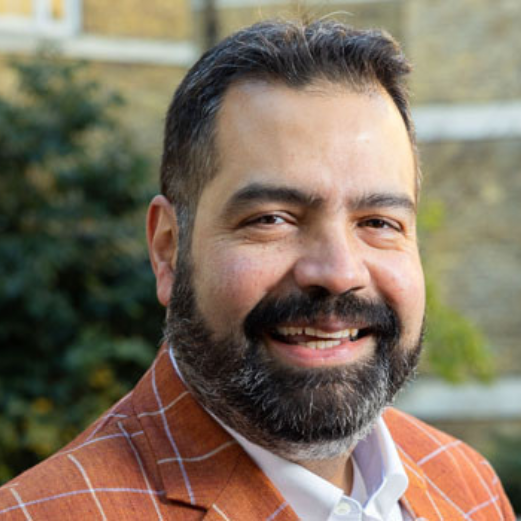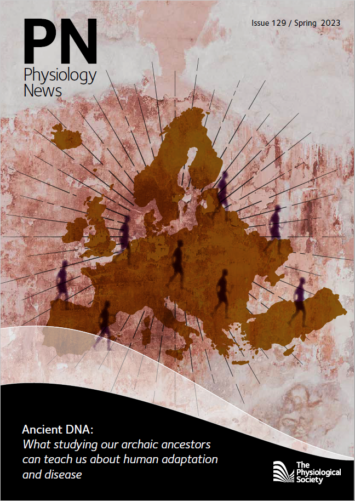
Physiology News Magazine
Introducing Dr Nephtali Marina-Gonzalez, our General Trustee leading The Society’s Equity, Diversity, and Inclusion (EDI) work
Membership
Introducing Dr Nephtali Marina-Gonzalez, our General Trustee leading The Society’s Equity, Diversity, and Inclusion (EDI) work
Membership
The importance of role models, advocates for diversity and the need for long-term commitment to EDI. In this Q&A, Nephtali shares the challenges to achieving a more inclusive scientific community and the changes he would like to see to achieve this. The gains will ultimately lead to greater innovation, creativity, and progress for all.

Tell us a bit about yourself
After completing my medical training from the National University of Mexico I decided to pursue a career in physiology research and I gained Masters and PhD degrees in Neurosciences before taking up academic positions at Cambridge and University College London. I have devoted my scientific career to the study of the autonomic control of cardiorespiratory physiology with a special focus on the pathogenesis of arterial hypertension. I am currently serving as Vice Dean (Equality, Diversity, and Inclusion) for the UCL Faculty of Medical Sciences.
What inspired you to get involved with Equity, Diversity, and Inclusion (EDI) work?
As an ethnic minority myself (born and raised in Mexico) I have witnessed the challenges of EDI inside and outside academic research. The social inequities and disparities brought to light during the COVID-19 pandemic inspired me to use my experience and resources to promote inclusion by empowering people who are often under-represented and ensure they have equal opportunities to succeed in their careers.
As The Society’s EDI Champion, what would you like to achieve in the role?
The future of The Physiological Society will be shaped by the commitment of staff, Trustees and committee members to promoting EDI. I would like to see more initiatives aimed at increasing the representation of marginalised groups in Physiology research and education, as well as promoting equitable access to opportunities and resources within the field. As The Physiological Society community becomes more diverse, it will be better equipped to address the challenges of our rapidly changing world and create more effective solutions that benefit everyone.
What challenges do you hope to address?
A big challenge is the lack of adequate support. Promoting EDI is labour-intensive, and research institutions need to allocate resources required to implement, monitor and maintain these initiatives effectively.
The main change I would like to see is long-term support and commitment for EDI. Achieving short-term changes can be relatively easy but maintaining a diverse and inclusive culture over time can be challenging, and research organisations must continuously work to foster an environment that supports EDI.
What do you think is the main aspect of positive change in EDI that is happening currently?
I am excited to see that some organisations are starting to commit dedicated funding for under-represented early career researchers who face numerous obstacles in advancing their careers in science and academia. Providing dedicated funding will help mitigate these barriers and provide more equitable opportunities for under-represented researchers to succeed in their careers. This will also help to address the leaky pipeline issue and ensure that the next generation of researchers are more diverse and inclusive as well.
What do you think is the major obstacle that often goes unnoticed, that is keeping us from a diversity-inclusive and equitable scientific community?
One major obstacle is the underrepresentation of women and of racial and ethnic minorities at leadership and decisionmaking levels in many institutions. This creates a lack of role models for students and early-career researchers and limits their ability to advocate for diversity and inclusion.
Have you any words of advice for your colleagues on how to be an ally and actions to support more diverse communities?
I have a few!
Listen to the voices of under-represented communities, and use your networks to amplify their voices and perspectives.
Challenge discriminatory language and behaviour, and speak out against institutionalised barriers that limit opportunities for diverse communities.
Get more engaged and champion initiatives that promote diversity and inclusion in your institution and advocate for policies and practices that address systemic barriers and promote equity and fairness for all people.
Being an ally is a journey, not a destination, and it’s important to continue learning, and advocating.
To finish, what is your favourite city and why?
I love San Sebastian in the Basque country. The friendliness of the culture and the beautiful gastronomy are unparalleled!
The Society will champion diversity, promote inclusivity, and strive for equity through its Equity, Inclusion and Diversity Roadmap. Find out more at physoc.org/about-us/diversity/
